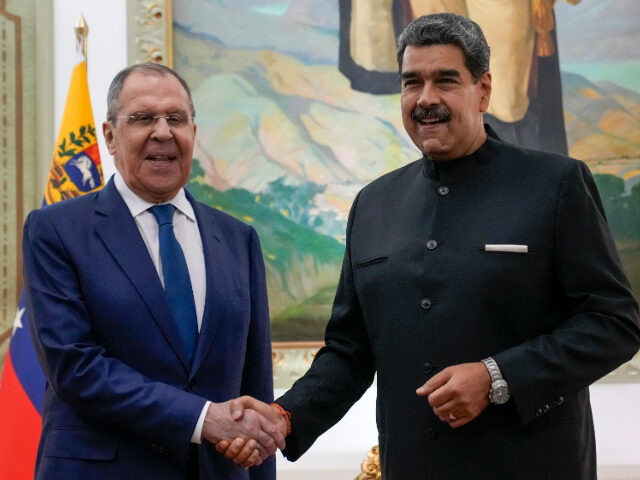Russia will increase cooperation on “peaceful nuclear energy” with Venezuela’s socialist regime as well as in the field of oil production, Russian Foreign Minister Sergey Lavrov said during a stop in Caracas on Tuesday.
Lavrov made a one-day stop in Venezuela as part of a broader Latin America tour that began in Cuba on Monday. In Caracas, he met with socialist dictator Nicolás Maduro, Vice President Delcy Rodríguez, and Venezuelan Foreign Minister Yván Gil.
“We put special focus to increasing trade and economic relations. There are numerous opportunities here. The high-level intergovernmental trade and economic commission between Russia and Venezuela plays a critical role in our opinion,” Lavrov said at a press conference following his meeting with Gil.
“Peaceful use of nuclear energy, which we also discussed today, looks promising,” he continued. “We decided to accelerate and expand our cooperation in all these areas.”
Lavrov asserted that Russia is ready to “share the experience” it has accumulated in recent years with the Maduro regime in the energy sector to help contribute to national economic stability and strengthen the two rogue nations’ technical autonomy.
“Venezuela is one of Russia’s most reliable and closest friends, not only in Latin America but in the world,” Lavrov proclaimed after meeting with his Venezuelan counterpart, stressing that Russia is “very grateful” for Venezuela’s interest in helping the development of relations between Moscow and various Latin American regional organizations.
During his joint press briefing with the Russian foreign minister, Gil described both countries as “victims in the international scenario of the illegal, irrational, and illegitimate” sanctions, which he claimed are “unilateral coercive measures.”
“None of the sanctions have been lifted against Venezuela,” Gil claimed — a false statement. In October, the Biden administration gifted a generous oil and gas sanctions relief package to the Maduro regime in exchange for vague promises of holding a “free and fair” presidential election sometime in 2024. So far, the Maduro regime has shown no signs of interest in upholding its end of the deal.
The Maduro regime, much like the Castro regime, expressed to Lavrov its willingness to join the China-led BRICS trade and security bloc. Lavrov stated after his private meeting with Nicolás Maduro that Moscow will facilitate Venezuela’s adhesion to the group in its capacity as the group’s rotating chairman in 2024.
“We know that our Venezuelan friends are interested in closer ties with BRICS, and Russia will facilitate the process as the group’s chair this year,” Lavrov said.
Maduro described his “gratifying” private encounter with Lavrov as a meeting “full of solidarity and cooperation,” adding that he conversed with Lavrov on the topic of reinforcing strategic cooperation during their “fruitful and excellent” meeting.
“We are brotherly people working together for the prosperity of Russia and Venezuela!” Maduro wrote on social media.
Venezuela’s plans to develop nuclear energy with the aid of Russia harken back to 2010 when late dictator Hugo Chávez signed a deal with former Russian President Dmitry Medvedev to construct a nuclear power plant over the next 10-15 years. Chávez called off the plan in 2011, claiming that the disaster at the Fukushima Daiichi Nuclear Plant had shown him that the “dangers of developing nuclear power were too great.”
“It is something extremely risky and dangerous for the whole world,” Chávez said at the time. “Despite the great technology and advances that Japan has, look at what is happening with some of its nuclear reactors.”
Christian K. Caruzo is a Venezuelan writer and documents life under socialism. You can follow him on Twitter here.

COMMENTS
Please let us know if you're having issues with commenting.